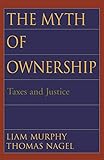The myth of ownership Taxes and justice
Publication details: Oxford Oxford University Press 2002Description: 228P PBISBN:- 9780195176568
- 336.200973 MUR
| Item type | Current library | Collection | Shelving location | Call number | Status | Date due | Barcode |
|---|---|---|---|---|---|---|---|
 BOOKs
BOOKs
|
National Law School | MPP SECTIO | MPP Section | 336.200973 MUR (Browse shelf(Opens below)) | Available | 35324 |
Browsing National Law School shelves, Shelving location: MPP Section Close shelf browser (Hides shelf browser)

|

|

|

|

|

|

|
||
| 335.412 NIC Marxs theory of price and its modern rivals | 335.412 RUC Development and globalization | 336.001 MAR Coercion and social welfare in public finance | 336.200973 MUR The myth of ownership | 336.2416 ZUG The hidden wealth of nations | 336.73 MUS Public finance in theory and practice | 337 EYB The politics of evidence and results in international development |
Distributive Justice - Tax Incidence
Taxation - Social Aspects - U S A
Table of Contents
Chapter 1. Introduction
Chapter 2. Traditional Criteria of Tax Equity
1. Political Morality in Tax Policy: Fairness
2. Vertical Equity: The Distribution of Tax Burdens
3. The Benefit Principle
4. Ability to Pay: Endowment
5. Ability to Pay: Equal Sacrifice
6. Ability to Pay as an Egalitarian Idea
7. The Problem of Everyday Libertarianism
8. Horizontal Equity
Chapter 3. Economic Justice ni Political Theory
1. Political Legitimacy
2. Consequentialism and Deontology
3. Public Goods
4. Benefits for Individuals
5. Efficiency and Utilitarianism
6. Distributive Justice, Fairness, and Priority to the Worst Off
7. Equality of Oppotunity
8. Legitamite Means and Individual Responsibility
9. Rewards and Punishments
10. Liberty and Libertarianism
11. The Moral Significance of the Market
12. Personal Motives and Political Values: The Moral Division of Labor
13. Conclusion
Chapter 4. Redistribution and Public Provision
1. Efficiency and Judgement
2. Paying for Public Goods
3. Which Goods are Public?
4. Redistribution
5. Transfer or Provision?
6. Public Duties
7. Conclusion
Chapter 5. The Tax Base
1. Efficiency and Justice
2. Outcomes, not Burdens
3. The Consumption Base and Fairness to Savers
4. Fairness as Equal Liberty
5. Desert and the Accumulation of Capital: The "Common Pool"
6. Wealth and Welfare
7. Wealth and Opportunity
8. Endowment and the Value of Autonomy
9. Exclusions and Credits
10. Transitions
Chapter 6. Progressivity
1. Graduation, Progression, Incidence, and Outcomes
2. Assessment of Outcomes
3. Optimal Taxation
4. Tax Reform
Chapter 7. Inheritance
1. The "Death Tax"
2. The Tax Base of the Donee
3. No Deduction for Donors
4. Details and Objections
5. Equal Opportunity and Transfer Taxation
6. Conclusion
Chapter 8. Tax Discrimination
1. Justifying Differential Treatment
2. An Example: The Marriage Penalty
3. Incentive Effects and Arbitrariness
Chapter 9. Conclusion: Politics
1. Theory and Practice
2. Justice and Self-Interest
3. Plausible Policies
4. Effective Moral Ideas
Notes
References
Index

There are no comments on this title.